You call them ‘sponsored posts.’
I call them ‘paid links.’
You see, when you say ‘sponsored content’, I think of something like this:
But in reality, you’re talking about something more like this:
Now, those two links are exact match anchor text, “dofollow” links:
That’s why I call them ‘paid links,’ because the purpose of that entire article was to get a link from your blog to whoever paid for it. It’s not a collaboration, it’s not branded content, it’s not a review.
So, the ad rate/media pack you sent is actually a very formal – and sometimes convoluted – way to tell me how much you will charge for a link.
I’d like to say there’s nothing wrong with that, but that’s not what I believe in.
Let’s talk about it, shall we?
The Blogger’s Case for Getting Paid in Exchange of Sharing Content
I always reply back to bloggers letting them know that we don’t have a budget for sponsored content and every now and again they will argue against it.
Last month, I exchanged quite a few emails with one person that helped me see the situation from their perspective:
I’ve written about why we don’t pay for links before, but this email made me think about it a bit more.
I get it, this is your job.
You didn’t create your blog to share your views with the world; this is your source of income.
I know many people who blog for a living, and they tell me about how difficult it can be to monetise their site.
Believe me, I get it. I used to have my own blogs too, although as an affiliate.
Being a blogger in a world where advertising is not the almighty force it used to be is certainly a challenge.
But that doesn’t mean I will disregard the fury of Google penalties:
Link buying is a highly scalable link building technique: you put money into one side of the machine, you get links back to your site from the other.
Google is tackling this situation one update/guideline at the time, and could you blame them?
Their algorithm needs links to function: The cleanest the links, the more accurate the picture they present to their users.
Creating content in the hopes of earning links is not scalable. Sometimes it works, sometimes it doesn’t but it always takes time and costs money.
As a blogger you have a choice:
If you like the content and you think it fits your blog, you can feature it.
If you don’t like the content, you move on.
Now, if I tell you I’m giving you the content AND £200 – will you say no if you don’t like it?
Every blogger that gets back to me with their media pack doesn’t even address the content. They don’t tell me if they liked it or if they think their readers will like it.
Frankly, it feels like they don’t care about it:
A big difference when compared to those bloggers who don’t charge:
But at the end of the day, it’s your choice to make.
And that’s how the best content raises to the top, or how it should be anyways.
That’s Reddit.
That’s memes.
That’s viral videos.
That’s what we get paid to do: Creating content people will want to share.
And as I said to a blogger during a we-don’t-pay-for-links discussions, if our content is not good enough it shouldn’t get links:
So the argument “they paid you to get them links but you’re not sharing the pie with me” doesn’t apply.
They paid me to create a piece of content and share it with relevant people who might like it enough to share it: you didn’t like it, that’s fine.
I’m not the middle man between my client and a link.
And my team is not working their butts off to get an invoice paid at the end of the chain – that’s not fulfilling work for anybody.
So let’s not make it into a this-is-so-unfair situation because the choice is all yours to make.
Why Bloggers Should Care About the Risk of Selling Links
At the end of the day, I’m doing this for you too.
Yes, I’m protecting my client. Yes, I’m protecting our reputation as an agency.
But I’m also trying to save you from losing everything you’ve worked so hard for.
And you know this.
You are aware that there’s a big fat chance that Google might penalise you too:
Bloggers that have become influencers (who now offer consultancy services and collaborate on massive campaigns with brands) are not getting back to me with one sentence emails explaining how much it will cost me.
You don’t get to that point without caring about the content you put on your blog, without caring about strengthening your relationship with your readers.
This is a big picture situation, you’re missing the forest yada yada yada.
If you build a business model around selling links, you’ll be the last one standing after a game of musical chairs.
Google penalties are getting real:
Google wants you to nofollow all links coming from sponsored content and for the posts to be tagged accordingly.
But SEOs don’t want to create patterns so having lots of links with the word “sponsored” in the URL or containing “sponsored” within the body of the content sounds risky.
And let’s be honest, they are not looking for nofollow links either.
That’s where the deals get dirty, because then we find a workaround:
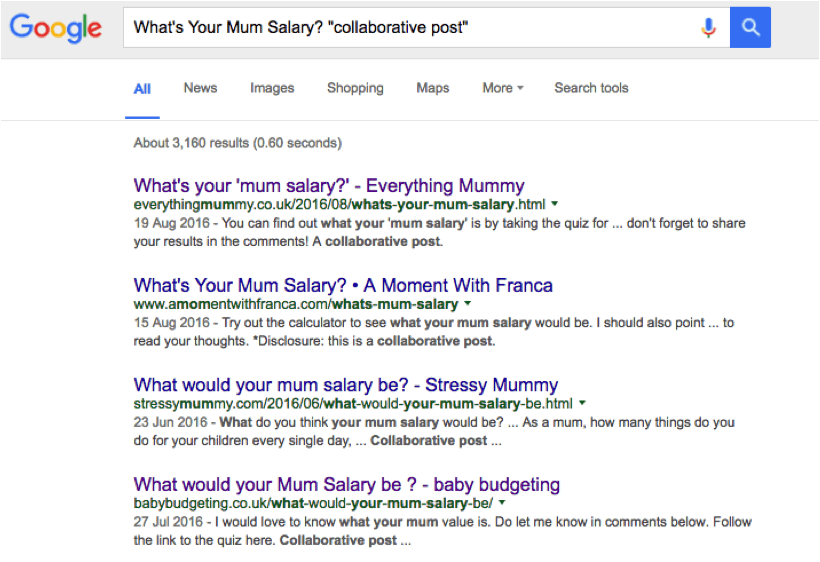 And no, these are not round-ups – although, you’ll find plenty of truly collaborative posts out there.
And no, these are not round-ups – although, you’ll find plenty of truly collaborative posts out there.
This is a rebrand: It’s not ‘sponsored content’ anymore, it’s a ‘collaborative post.’
These are dofollow links too, by the way:
How long do you think we can get away with it?
A few years, at the most?
Is this part of a short-term business strategy, where you just want to make it to next summer?
Agencies Play a Big Role in This Situation
Listen, I’m not blaming bloggers here – I’m just trying to show them the big picture.
If it took me less than 5 minutes to put together a list of 15 mummy bloggers who get paid in exchange of links, how long do you think it will take Google?
We’re talking about a business that relies on links not being manufactured, and a $498 billion business at that.
What kind of relationship are you building with bloggers anyway?
Do you plan on maintaining these relationships 5 years down the line, or are you just looking for one-night stands?
If all the work you put into creating a piece of content has the goal of getting those 10 links that you will pay for anyway, why do you even bother?
Every time an agency pays for a link, a puppy dies the cycle continues.
Do you really want to be running around like a headless chicken every time there’s a new update to Google’s algorithm?
I guess not.
So, I’d recommend you have a think about the position you’re putting all these bloggers in.
Why I’m Even Writing This Article
A month ago I started pitching content every day; it’s been a year or so since I had a front row seat to outreach.
I love pitching content and I love building links, but the fact that nothing has changed hit me like a ton of bricks. Well, some things have changed: the rates bloggers are charging now are way lower than I remember.
Every time I launch a campaign, I receive 5-10 replies asking for money within the first few minutes of sending the email.
And the responses that follow my email saying that we don’t have a budget for sponsored posts are getting nastier.
I have shared my post about why we don’t pay for links with a few bloggers but I feel they still don’t get it. They think we’re being cheap, that we’re trying to scam them.
I’m hoping that this post will give me the chance to explain.
This is not about changing their minds from one day to another but then again, it doesn’t hurt to try.
But what do you think about all this? You’ll find me on @ichbinGisele.
Image Source: Thomas Galvez
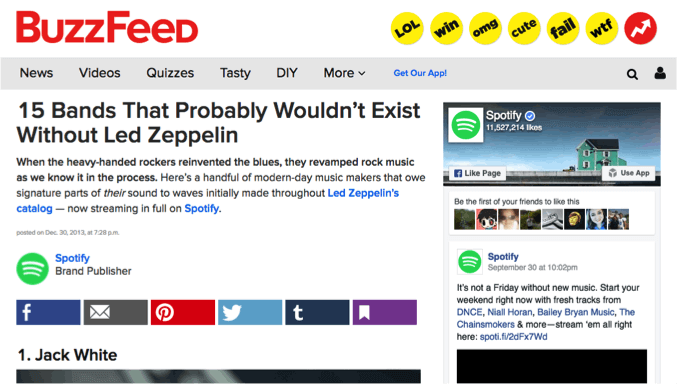
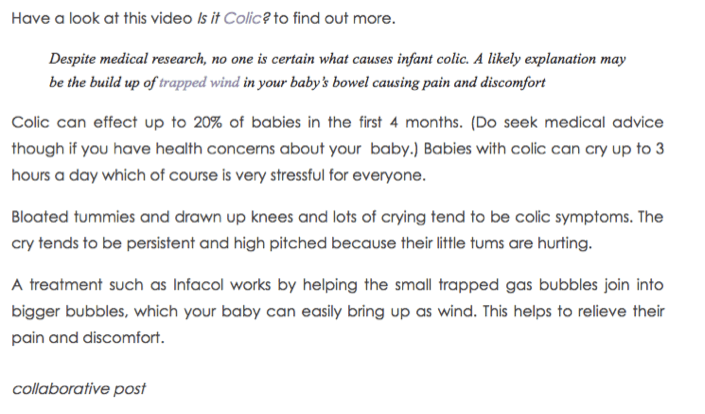

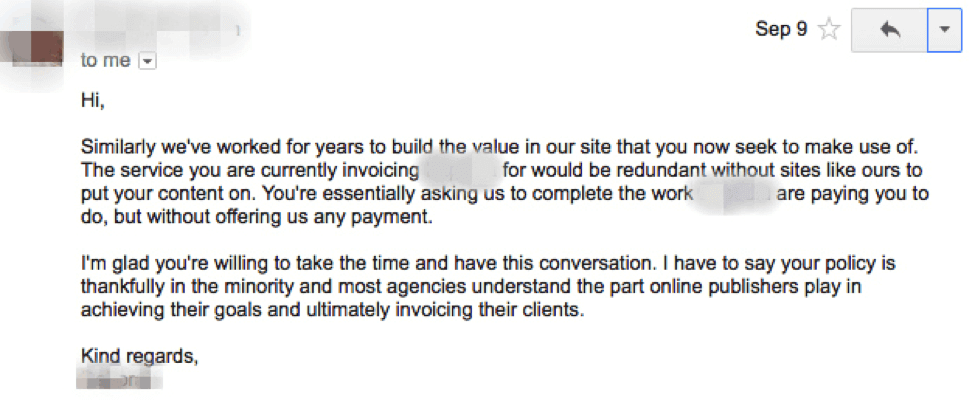

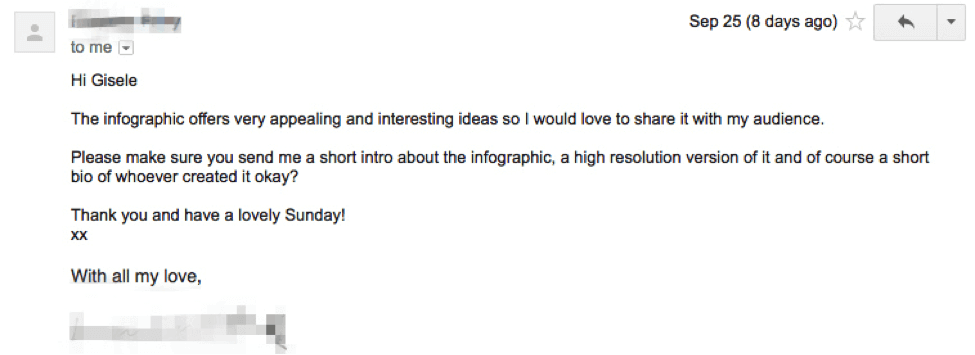


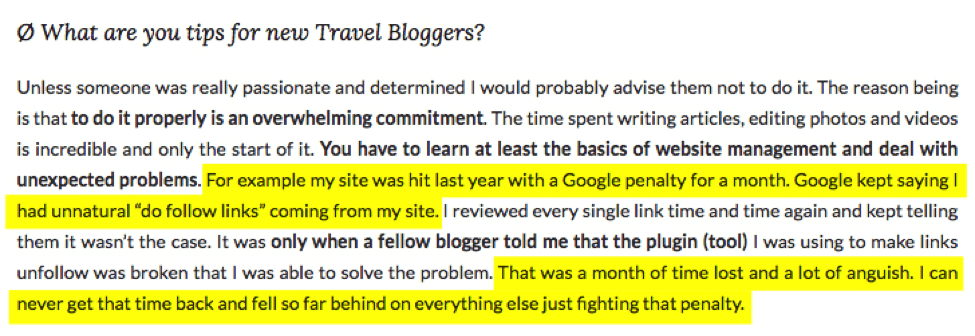
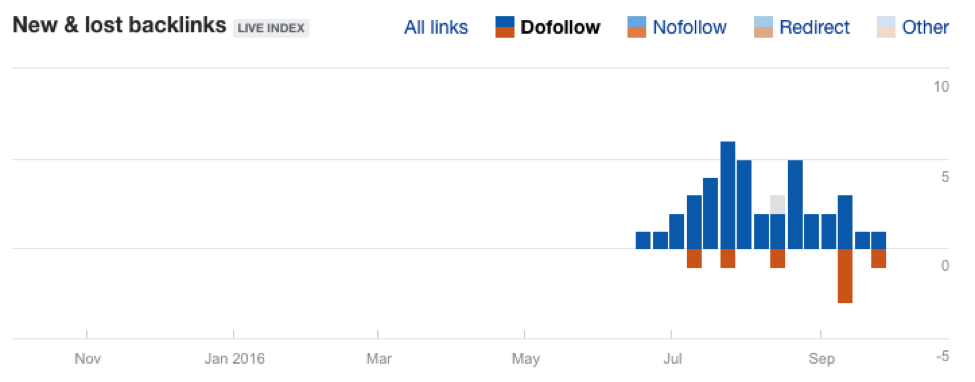
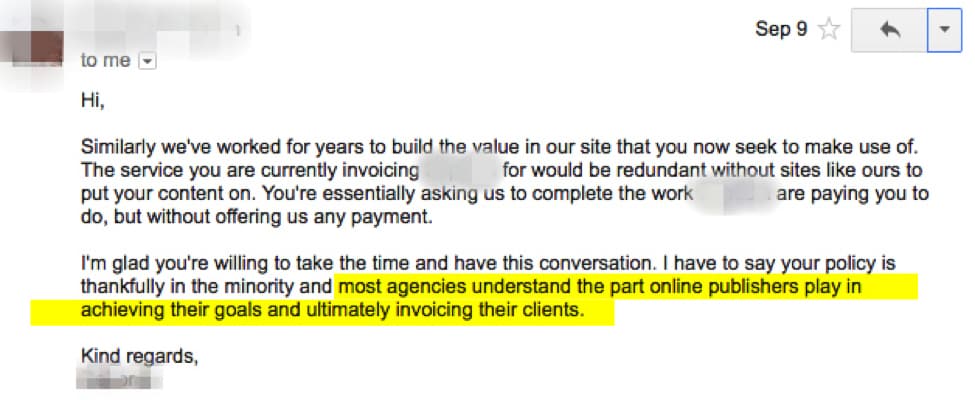
Hello Gisele,
How are you? Hope you’re doing fine!
So I read the whole article and it really great but my questions are:
“If the link is relevant to the content, Can we give a dofollow link then?”
“If we write a sponsored review then it’ll also harm us?”
Looking forward to my answers! 🙂
Hi Abdul! Sorry about the delay, I didn’t see your comment! Thank you for reading 🙂 In regards to your questions, I’d recommend you to use nofollow just to stay on the safe side – my personal rule is to dofollow high authority domains or original sources I’m citing. In terms of sponsored reviews, you should always nofollow and disclose the fact that it’s a sponsored review – you should read the latest update to Google guidelines about them: https://webmasters.googleblog.com/2016/03/best-practices-for-bloggers-reviewing.html
I don’t think your “dofollow” example is something to worry about, at all. Read this to get some more perspective on it: https://www.quora.com/What-is-the-difference-between-no-follow-and-do-follow
Hi,
Your strictness towards not paying for the links has made me reaffirm the fact that it is actually no use buying links, come what may.
Yes, it is the posts like these, which eventually creates an awesome and healthy atmosphere, where bloggers won’t go after money.
Thanks for providing such a detailed post.
Hi Afzal! Thank you for reading my post and for sharing your comment. I am not expecting this post to change things but I felt that it had to be said. Have a good week!
Yes, but your company is also being sneaky and calling them ‘guest posts’. A guest post on a blog to me is a writer who wants to share information or a story with an audience by either getting paid for it (a freelancer) or building a portfolio – or even just for fun. When you contact bloggers to do a ‘guest post’ and it’s revolving around an infographic made by a top hotel booking site, that’s NOT a guest post. It’s promotion. Did you pay someone to design and illustrate the graphic? Is your staff getting paid to write the article you want placed on my blog? So why does the buck stop there? Why am I not supposed to receive a cut in this process? Unless your all volunteering your time for fun, I’m not sure why I’m being asked to spend my time, while I’m working, on my job and my site, to do something for free. Find other sites or other ways to link build off of then other than blogs, it’s insulting.
Hi Eileen! First of all, thank you for taking the time to read the post and leaving your views for us to discuss.
Just to clarify things, we don’t call it guest posts, we actually invite journalists, editors and bloggers to check out the content and let us know if they think it would fit their site/column/blog. Sometimes bloggers do request content to run them as guest posts and in those cases, we ask the copywriter who worked on the research and content for the piece to write an article following the editorial guidelines that were provided to us. And there are times when members of the promotion team find that a site has a space for contributors or is looking for writers and they will pitch using that potential door.
As I said on the post, you are given the choice to either run the piece (whether it’s an infographic, a video or a series of illustrations) or tell us it’s not how you work and how much you will charge. When we get to that point, we always reply explaining that we don’t have a budget for sponsored posts. Some bloggers really like the content and decide to run it anyway, whilst others tells us that they don’t work that way.
And it’s fair! You make money with your blog the way you see fit. We spend months working on the content because we aim for features to be organic, we want to create something that is so good that people will snatch it out of our hands. And when that doesn’t happen, we failed. And when we fail, we produce and promote another piece of content for free because it’s our responsibility.
At the end of the day, it’s your blog and I’m not here to tell you how to run it. With this post all I want to do is to state that there is a risk to selling links and it’s a second part to my first post about why we don’t pay for links – a post that I’ve been sharing with bloggers as well.
Sorry, but that’s untrue. I literally commented because your colleague sent me an email asking to ‘guest post’, I declined to do so for free because he represented a client and he forwarded me this link to your post. So your company’s methods are sneaky and borderline unethical, just as the bloggers you’re attempting to call out in this post.
Hi again! I’ve just asked everyone to send me their pitches and found your email thread, so I see where you’re coming from.
As I said on my comment above, sometimes the team reaches out to sites that have a “Write for us” section using that approach and that was what happened here. In any case, even in that scenario you still have the choice whether you think the content is good enough to be shared with your audience or not. We really want people to say ‘no’ if they don’t think it brings value to their readers; we shouldn’t get editorial privilege just because we paid for it.
Look, I still think that there’s lots of opportunities for brands to harness audiences like yours but buying those links shouldn’t be one of them.
At NeoMam we have a policy of not paying for features since we started the agency back in 2010 and we will continue to honour it. I’ve actually written another article a while back explaining why – if you care to read, it might give you more insight into why we work like this: http://neomam.com/blog/5-reasons-why-we-dont-pay-for-links/
Thanks for making me barf.
We’re always looking forward to creating content that will make people take action but we never considered this scenario!
Lots of big brands pay for good content with nofollow links, those are the ones we want. A lot of us are trying to create a business at the end of the day, and not all advertising is about google ranking (which is all dofollow links are about at the end of the day!)
This comment will probably get deleted or never see the day of light, since you will clearly NOT ‘like the content I’m sharing, and I’m not paying for it’, but if you are even 1% legit, please answer one question. Are you okay with me sharing your ‘infographic’ for free because I found it interesting and not offer a backlink or explicit attribution? No? I didn’t think so! Please stop assuming the moral high-ground and writing pieces such as these that are aimed outright at trying to shame honest, hard-working content-creators making a living. Some bloggers do not understand the risks around Sponsored Content, many do. They can make an informed, calculated decision on whether they want to engage in this sort of a relationship. You on the other hand trying to make people feel bad about charging for something that you will directly benefit from through your clients is at best a sly, SLY attempt at creating a win-lose situation. I openly offer guest posts to other bloggers and content creators for FREE. Agencies and brands need to pay, since you make money off us. Also, make no mistake about it, you as an agency ARE the middle man – this piece has fooled very few bloggers that you’ll receive any sort of value from working with. In fact, if anything, you’ve gone right into my blacklist. Thank you for that 🙂
Hi Sanket! Thanks for stopping by and for leaving a comment, it means a lot.
In reply to your question: ‘Are you okay with me sharing your ‘infographic’ for free because I found it interesting and not offer a backlink or explicit attribution?’ Simple answer: yes. That happens every now and again. All of our designs are licensed under Creative Commons and require for the person who shares the images to credit back to the original source, so we will tell you that. But sometimes bloggers will get back saying ‘I really like it but I won’t link’ and we’re happy for them to share the content anyway because we want people to see it at the end of the day.
I agree with you, some bloggers do not understand the risks around Sponsored Content and that’s the one reason why I wrote this article. I didn’t mean to make anyone feel bad about how they do business, or how they run their blog. As I said above, it’s a choice you make and a business you build. I thought it was important to discuss this as I knew it would spark conversations such as this one we’re having.
And I know that there are benefits to sharing our content, otherwise nobody would do it. We spend a lot of time working on it and it always ignites discussion and shares, which is something that can be hard to achieve.
I really didn’t want to make anyone feel bad; there’s too much of that in the world as it is. Have a nice evening and thanks again for sharing your thoughts.
Fair enough. Having said that, still feel the tone of this piece was rather condescending. Perhaps you’d do well to remember it is you (by you I mean agencies) that reach out to bloggers asking them to share something. It might not hurt to mention you are not looking for a linkback and will not pay for one in your initial note itself, unless of course, you are just hoping some of the people you reach out to just do it for free nonetheless, which again, makes you the sly one, doesn’t it?
Thank you for keeping it civil though – I understand I must sound like a pissed off blogger, and I was until I read your response. There’s just far too many of your kind that want to mislead and get bloggers to do stuff for free.
It’s refreshing to hear you don’t pay for links. I don’t accept payments for follow links and turn down a lot of money from link building agencies. I just won’t risk the Google penalties.
I do however work with companies who ask for nofollow links because they are just looking for honest reviews on a popular blog. The value for them is being talked about by a digital influencer. Although only this week I’ve been told by a link building agency that Google’s guidelines don’t allow that either so I should just publish posts and links for free. Err, no. I burn far too much midnight oil for that.
How you want to work with bloggers obviously depends on your objectives. Something I find frustrating when I’m contacted by agencies (apart from being told they’re a big fan of my blog) is that they don’t always make their objectives clear. If they want a dofollow link they often hide this until after they’ve dangled the cash carrot. For new bloggers, this can be too much of a temptation. They are led down the dangerous path of being paid for follow links before they understand the potential consequences.
Google has set out its stall on the matter, now maybe it’s time for the marketing/SEO/digital content industry to have its own standards for what’s acceptable? Posts like yours will hopefully get the ball rolling among your colleagues/competitors. And maybe change you post title to ‘Please, stop buying links’.
Hi Claire! Thank you for spending time reading the post and for sharing your views on the matter. This is the kind of discussion I was hoping this post would ignite, so I’m super happy to read so many comments.
It’s very interesting to me to hear how you guys feel and what you think on this issue, as it’s easy to just get stuck with the perspectives inside of our bubble – which in my case is the digital marketing industry. It’s good to hear that there are agencies out there who will warn you guys and will ask for you to follow Google’s guidelines because they are no joke, and it’s our responsibility to make sure you don’t lose your site as much as it is to protect our clients.
I like your idea of changing the title. This is actually a part two, which started with a post on why we don’t pay for links (http://neomam.com/blog/5-reasons-why-we-dont-pay-for-links/) so I thought it would be good to write about the selling side of things. But yeah, I added an entire section addressing agencies because I know that at the end of the day it’s us who have the power to improve the way we work and find better ways to collaborate and add value.
Thanks again for taking the time to comment on here – it means a lot.